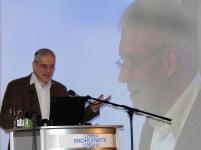 In a keynote speech delivered at an annual forum of Serbian economists the country’s president Boris Tadic delivered an impassioned call for an end to links between business, the state and crime.
In a keynote speech delivered at an annual forum of Serbian economists the country’s president Boris Tadic delivered an impassioned call for an end to links between business, the state and crime.
Addressing what some sections of the media have dubbed “Serbia’s Davos”, Tadic told delegates that without greater development of civil society, a wider acceptance of the rule of law and an end to corruption, Serbia’s future looked bleak. He called on society and business to break the links that he said had emerged during the time of former president Slobodan Milosevic.
“If these ties are broken, we have a chance – but no guarantee – to have a better future. The guarantees are in economic and social reforms, which we will implement,” Tadic said. He added that the economic situation in the country was difficult, that the poorest in society would be most affected and that action was needed to stop the decline. “No one has the right to behave as they did in earlier years,” Tadic told the gathering.
He said that while it may have been necessary for the country to spend more than it earned to drag it out of the Milosevic induced years of economic decline, excessive spending now would “only contribute to a new destruction”. He warned “representatives of big business” that they would not be able to earn as much as they earned before and said small and medium-sized enterprises would not be able to take out loans as easily as before.
The conference, attended by many of Serbia’s top politicians and business people, also addressed the government’s economic policy.
Prime Minister Mirko Cvetkovic, Minister of Economy and Regional Development Mladjan Dinkic and Minister of Finance Diana Dragutinovic also addressed the forum.
Cvetkovic and Dinkic both repeated earlier assurances that the signing of a new stand-by arrangement with the International Monetary Fund wold merely contribute to stability and was purely a precautionary measure.
Cvetkovic admitted that the budget deficit was likely to reach 2.5 – 3 per cent, rather than the previously projected 1.75 per cent.
Contrary to the opinions of many economists, Dinkic claimed that Serbia “would not enter a recession” . Serbia should have an expansive fiscal policy, with a budget deficit up to 3 per cent at the most, coupled with a moderately restrictive monetary policy, though he said interest rates should be reduced. Recession, would be avoided, he said as long as the decline in industrial production could be kept below 10 per cent by the end of the first quarter.
Dinkic pointed to the high levels of foreign debt accumulated by Serbian businesses, amounting to some €7 billion as one of the biggest problems facing the economy, contrasting it with what he said were low levels of public debt as a percentage of GDP.
Finance minister Dragutinovic warned that a coming second wave of the financial crisis would be felt more strongly in Serbia as the economy is “highly dependent on foreign capital” which would be more difficult to obtain. She also noted what she said was a huge gap between levels of savings and necessary investments. She warned that the country would have to take extra loans. The only alternative, she said, was to increase receipts from privatisations but noted that this would take time.
In a side meeting in Kopaonik, Cvetkovic and Dinkic met with Aleksander Lukashenko, president of Belarus to discuss a free trade deal between the two nations. Lukashenko, on a skiing trip to Kopaonik, took time off to discuss the implementation of a deal which they agreed should be ready for signing in Minsk at the end of March.
 Eurasia Press & News
Eurasia Press & News
